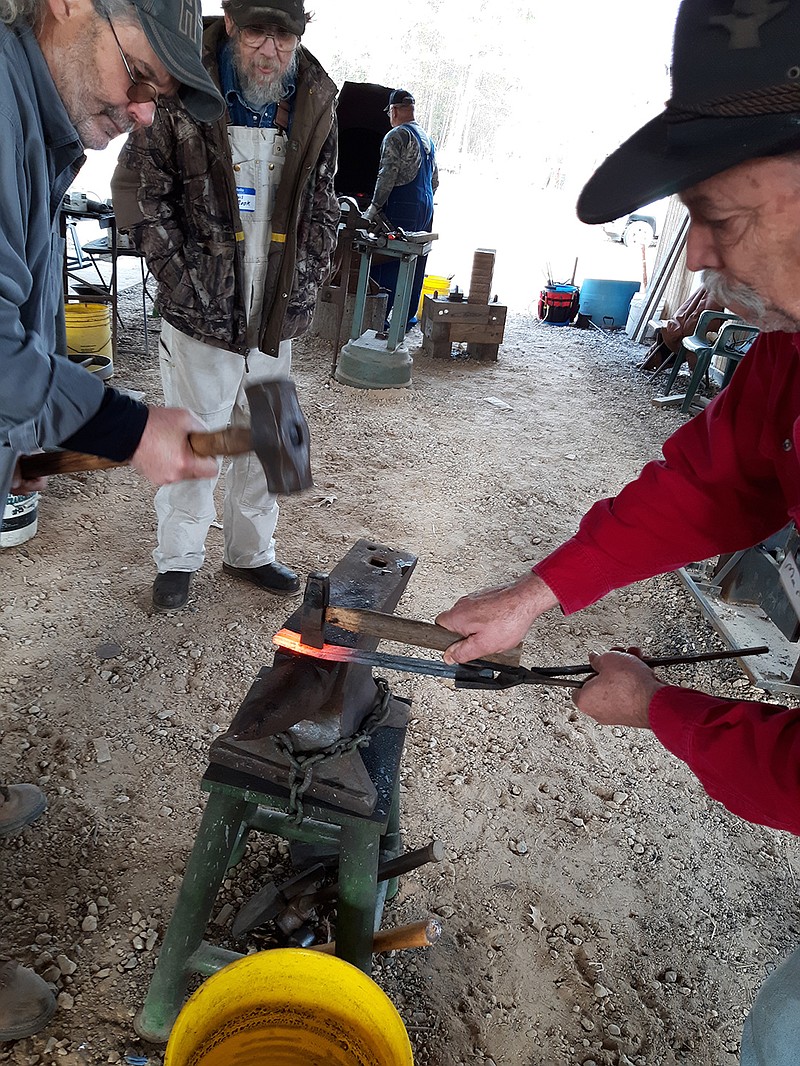The Four States Iron Munchers got together during their December meeting to celebrate the holidays and practice the art they love, shaping and forging metal. The group, having assembled in the 1990s, gives these enthusiasts an outlet to engage in the ancient art of blacksmithing.
"It is all about preserving this skill," said Keith Coleman, the Iron Munchers' webmaster. "This skill challenges those who practice it. Anyone can take a hammer and smack a piece of metal, but this set of skills requires problem solving and creative thinking. It also involves risk. You have fire, steel, sharp edges as well as hammers and other tool. There is nothing in a blacksmith's shop that can't hurt you if you don't show it proper respect. We have fire that reaches beyond 3000 degrees, the melting point of steel, which, depending on type, is between 2700 and 2900."
The Four States Iron Munchers is a part of the Artist-Blacksmith's Association of North America, a national organization dedicated to preserving the art of blacksmithing, which they've been doing since the 1970s. Similar organizations exist all over the world.
"There has been more media attention to blacksmithing, so more interest is coming our way, from programs on the History Channel and the like," Coleman said. "Blacksmiths are the only artisans who built the machines that put us out of business. But as long as humans can think, there will be those interested in the skill that make this practice possible."
There isn't much opportunity for someone with this skill set to make a living with it in the modern world, solely, but the Iron Munchers believe there is still value is the skills.
"We have retired military in our group. We have school teachers, lumber guys, machinists and other fields. Oh, and we also have lots of historians," Coleman said. "I personally make money doing shows and teaching. I came to this club to learn even more. And that's the thing, it is a very individualistic skill. You can ask 10 blacksmiths the same question and get 10 different answers. Some are better with the history, some with the science, some with the tool use."
"The kinds of folks who come into this craft tend to be semi-loners, who are able to get away, get in their heads and solve problems," said Bill Leshe, club member. "There tends to be generally curmudgeonly dispositions around. Accidents and pain tend to develop grumpy personalities."
This skill is not for everyone. Besides the technical challenges and environmental harshness, being a blacksmith simply involves hard work.
"Some come to us and find out just how much work is involved and never come back," Leshe said.
Some of the Iron Munchers participate in various community outreach efforts to educate the public.
"We work with Scouts on their metalworking merit badges," he said. "We have a few Scoutmasters in the ranks. But the essence of what we do is artistic. It is primal. It is historical. And it isn't just for men. Historically, one-third of blacksmiths were women."
For more information, the Four States Iron Munchers can be reached through their Facebook page.

